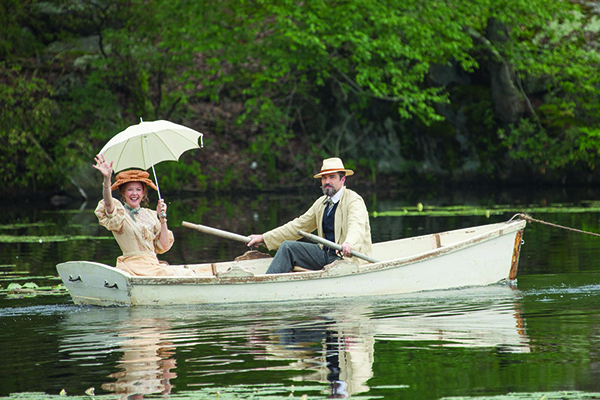This adaptation of Anton Chekhov’s play is handsomely mounted, as they say, and features a stellar cast (including Annette Bening, Elisabeth Moss and Saoirse Ronan), but it won’t be setting the world alight. It is not a waste of 90 minutes, and Bening is superb, as if you even needed me to tell you that. But it doesn’t especially distinguish itself otherwise and I kept waiting for it to deliver emotionally. I waited and waited and waited, but no, nothing.
The film is, of course, set on a country estate just outside Moscow, because if it weren’t set on a country estate just outside Moscow it plainly wouldn’t be Chekhov. The basic deal, if you don’t already know, is that everyone gathered at the estate is in love with someone who is in love with someone else. Medvedenko (Michael Zegen), the schoolteacher, is in love with Masha (Moss), the estate manager’s daughter, who is in love with Konstantin (Billy Howle), the aspiring writer, who is in love with Nina (Ronan), the ingénue from the neighbouring estate, who is in love with Boris (Corey Stoll), the successful writer who is, in turn, the boyfriend of Irina (Bening), Konstantin’s mother and a fading actress. There is a dog, but we never get to know if the dog is in love with the bitch that’s in love with that other dog, the one from the next village, although I would fully expect this to be the case.
Directed by Michael Mayer (A Home at the End of the World, but otherwise a theatre director), with a screenplay by Stephen Karam (author of the Tony-award winning stage play The Humans), the film opens with a scene from near the end of the play, when Irina is summoned to Sorin’s bedside. (Forgot to mention Sorin. He owns the estate and is Irina’s brother. He’s not in love with someone who is in love with someone else, but is dying, which is also tough.) The action then spools back to show us how we got here. Playing with time in this way does not distract from the business in hand but, I have to say, I couldn’t see how it added much to it either. From here on in, it all feels implacably straightforward even if, unlike theatrical productions, we can roam the lake and we can roam the woods where Konstantin stages his avant-garde play — the one he has written starring Nina, which his mother laughs at so cruelly although, in her defence, it does seem a truly shit play.
The performances are mostly first class. Moss is superb as vodka-sodden Masha, who is a tragic character, but Moss finds the comedy that is usually so often lost. Meanwhile, Ronan plays Nina as grand and melodramatic and bold on the one hand, and hopelessly naive and a bit of an idiot on the other, which is absolutely right. But it is Bening’s Irina who steals the show. Bening is an older actress who has lately specialised in playing older actresses (Film Stars Don’t Die in Liverpool, Being Julia) because she can convey all the layers required. Her Irina is cruel and vain and selfish and stingy and attention-seeking but we never lose sight of the vulnerability and fear and sadness underneath. If there’s a weak link, it may be Howle, whose Konstantin should be fuelled by Oedipal rage, but here often comes across as just a silly, sulky, pouting boy given to writing truly shit plays.
The Seagull itself is essentially a play about mood. It’s not so much what the characters are saying specifically, more what’s not said, and the mood that’s being created, and this somehow fails to capture that mood. That may be because it’s too frantic. The camera rarely stays still. It’s always going this way or that — sometimes cutting characters off at the neck while they’re speaking — and this did drive me slightly insane. (‘Just stay put!’ I wanted to cry.) The text has also been abridged (it runs to well over two hours in the theatre) so it feels rushed, as if we’re watching a highlights reel. Consequently, you simply aren’t given sufficient time to connect with the characters at an emotional level, let alone understand what this might be saying about love, art, jealousy and hopes destroyed.
Still, it’s not a catastrophe, not a complete waste of 90 minutes (Bening, remember?). And there is a gun.
This article was originally published in The Spectator magazine.


















